Perfusionist
Entry Level Qualification
12
Career Fields
Allied & Para Medical Science
For Specially Abled


About Career
1. Perfusionists are specialized healthcare professionals who manage and operate the heart-lung machine. They are responsible for running the heart-lung machine which artificially pumps blood in a patient’s body during open-heart surgeries.
2. The cardiovascular system (also called the circulatory system) acts as a transport system of the body as it consists of the heart, blood, and blood vessels. It is through these blood vessels, the blood circulates in the entire body while the heart pumps this blood to the other organs. When the circulation of blood in the body is interrupted, it directly impacts the functioning of the heart which in certain cases may even lead to heart failure. These disturbances in perfusion (flow of the flood in the body) could be either due to coronary artery disease; heart rhythm problems (arrhythmias) defects in the heart, etc.
3. With the advancement in technology used in cardiology, doctors and research scientists have found ways to replicate the function of the human heart to repair/fix or even replace it by using advanced technological equipment and devices such as Cardiopulmonary Bypass.
Key Roles and Responsibilities
As a Perfusionist you would be engaged in one of the many following roles and responsibilities:
1. You would be involved in reviewing the patient’s medical history and chart and consulting with a surgeon or physician to obtain patient information needed to set up the heart-lung machine and associated equipment.
2. You would be responsible for operating extracorporeal circulation equipment, such as the heart-lung machine, during open-heart surgery or any other medical procedure in which it is necessary to artificially support or temporarily replace a patient's circulatory or respiratory function
3. You would monitor a patient's vitals and then select appropriate equipment and techniques to manage normal blood flow, body temperature, and other respiratory functions.
4. You would work in the operating room with cardiac surgeons, anesthesiologists, physician assistants, surgical technologists, nurses, and other members of the healthcare team
5. You would monitor and keep track of the patient during surgery to ensure safe physiologic functions
6. You would consistently check various types of blood products and medications to patients during surgery
PARTICULARS | DESCRIPTION |
Name | Perfusionist |
Purpose | Operating Extracorporeal Circulation Equipment |
Career Field | Allied & Para Medical Science |
Required Entrance Exam | AIIMS MSC, AIIMS BSC |
Average Salary | 300000 - 400000 Rs. Per Year |
Companies For You | Fortis Escorts Heart Institute, Gangaram Hospital, Medanta & Many More |
Who is Eligible | Class 12th Pass |
Career Entry Pathway
Class 10 all subjects as per scheme of studies – Class 11-12 Physics, Chemistry, and Biology along with any other subject as per scheme of studies – B.Sc. in Cardiac Technology/ Cardiac Perfusion Technology (CPT) – Become a Perfusionist.
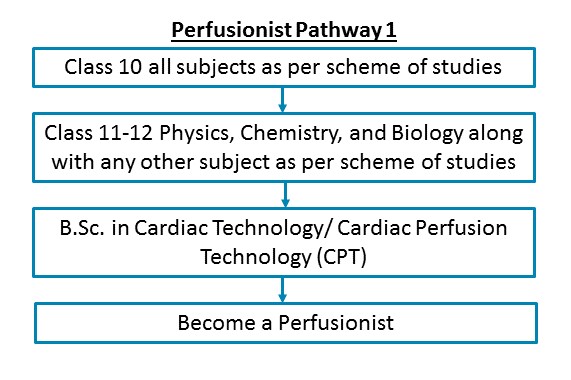
After completing Class 11-12 Physics, Chemistry, and Biology along with any other subject as per the scheme of studies you can go for a B.Sc. in Cardiac Technology/ Cardiac Perfusion Technology (CPT). After graduation degree, you can start working directly as a Perfusionist.
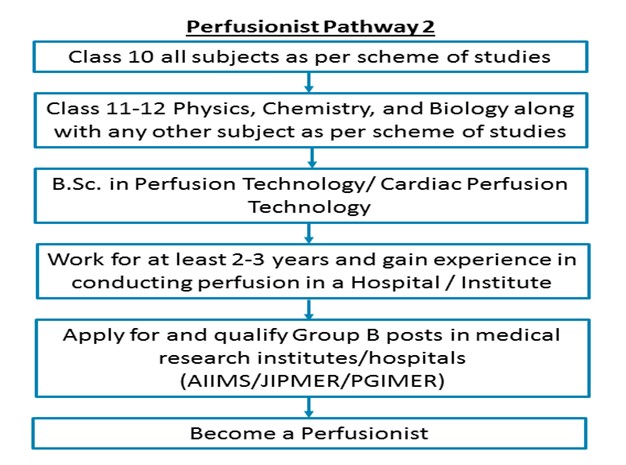
This career entry pathway is for those students who wish to become a Perfusionist in government medical hospitals. After completing Class 11-12 Physics, Chemistry, and Biology along with any other subject as per the scheme of studies you can go for a B.Sc. in Perfusion Technology/ Cardiac Perfusion Technology. After graduation, you must work for at least 2-3 years and gain experience in conducting perfusion in a Hospital / Institute and apply for and qualify for Group B posts in medical research institutes/hospitals (AIIMS/JIPMER/PGIMER) to become a Perfusionist.
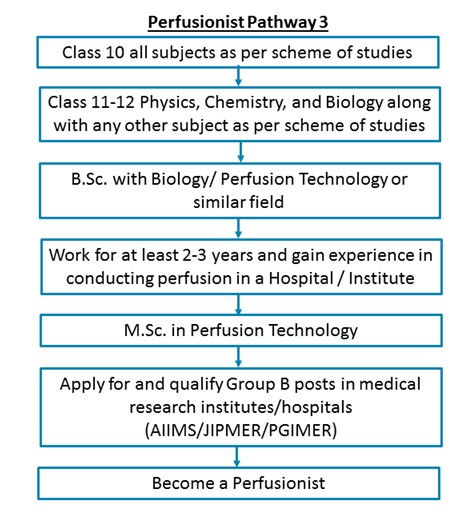
This career entry pathway is for those students who wish to enter a senior position as a Perfusionist in government medical hospitals. After completing Class 11-12 Physics, Chemistry, and Biology along with any other subject as per the scheme of studies you can go for a B.Sc. in Biology/ Perfusion Technology or a similar field. After graduation, you need to work for at least 2-3 years and gain experience in conducting perfusion in a Hospital / Institute and M.Sc. in Perfusion Technology. After acquiring a master's degree and some work experience you can then apply for and qualify for Group B posts in medical research institutes/hospitals (AIIMS/JIPMER/PGIMER) and become Senior Perfusionist.
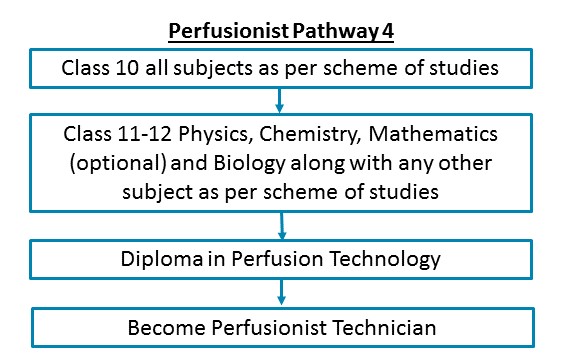
This is an entry-level pathway for students who wish to start working after completing higher secondary education. After completing Class 11-12 Physics, Chemistry, Mathematics (optional), and Biology along with any other subject as per the scheme of studies you pursue a Diploma in Perfusion Technology and start working as a Technician although a Bachelor’s degree is recommended to practice as a Perfusionist in government or private hospitals.
Required Qualification & Competencies
1. After completing higher secondary education you can pursue a Bachelor in Science (B.Sc.) in Cardiac Technology/ Cardiac Perfusion Technology (CPT) and start working directly as a Cardiovascular Technologist in government or private hospitals
2. After completing higher secondary education you can go for a Bachelor in Cardiovascular Technology/ Cardiac Perfusion Technology and work for at least 2-3 years to become eligible for the post of Perfusionist (Group B) in several medical research hospitals like AIIMS/JIPMER/PGIMER etc.
3. After completing higher secondary education, you can go for a Diploma in Cardiovascular Technology/ Perfusion Technology and start working as a Cardiovascular Technician but a bachelor’s degree is recommended to practice as a Perfusionist.
MINIMUM EDUCATION REQUIRED | MAXIMUM EDUCATION REQUIRED |
Under Graduate Undergraduate Degree / Honours Diploma / Graduate Diploma (equivalent to a Degree) Programs for which the minimum eligibility is a pass in Higher Secondary / Class XII School Leaving examination. | Post Graduate Postgraduate Degree / Diploma / Certificate Programs for which the minimum eligibility is a pass in Graduation / equivalent Diploma program like Honours Diploma or Graduate Diploma. |

Competencies Required
Interests
1. Investigative: You should have an interest in Investigative Occupations. Investigative occupations involve working with ideas and quite a lot of thinking, often abstract or conceptual thinking. These involve learning about facts and figures; involve the use of data analysis, assessment of situations, decision-making, and problem-solving.
2. Realistic: You should have an interest in Realistic Occupations. Realistic occupations involve more practical and hands-on activities than paperwork or office work. Realistic occupations often involve physical activities for getting things done using various tools and equipment.
3. Social: You should have an interest in Social Occupations. Social occupations involve helping or assisting others; these involve working with and communicating with people to provide various services; these may involve educating and advising others.
Abilities
1. Abstract Reasoning: The ability to understand ideas that are not expressed in words or numbers; the ability to understand concepts that are not clearly expressed verbally or otherwise.
2. Arm-Hand Steadiness: The ability to keep your hand and arm steady while moving your arm or while holding your arm and hand in one position.
3. Deductive Reasoning: The ability to apply general rules and common logic to specific problems to produce answers that are logical and make sense. For example, understanding the reasons behind an event or a situation using general rules and common logic.
4. Emotional Intelligence: The ability to understand your own and others' emotions and feelings; empathy for others; adjusting your behavior or self-control and self-regulation according to others' emotions and situations.
5. Finger Dexterity: The ability to make precisely coordinated movements of the fingers of one or both hands to grasp, manipulate, or assemble very small objects.
6. Flexibility of Closure: The ability to identify or detect a pattern (a figure, object, word, or sound) that is hidden among other distracting materials.
7. Hand-eye coordination: The ability to make quick and precise hand movements as per visual observations and understanding (that is, what you see and comprehend).
8. Inductive Reasoning: The ability to combine pieces of information from various sources, concepts, and theories to form general rules or conclusions. For example, analyzing various events or situations to come out with a set of rules or conclusions.
9. Inter-Personal: The ability to build and maintain good relationships with others at workplaces and elsewhere.
10. Mental Stamina: The ability to sustain prolonged mental effort.
11. Oral Comprehension: The ability to listen to and understand information and ideas presented through spoken words and sentences.
12. Oral Expression: The ability to communicate information and ideas in speaking so others will understand.
13. Problem Sensitivity: The ability to tell when something is wrong or is likely to go wrong. It does not involve solving the problem, only recognizing there is a problem.
14. Selective Attention: The ability to concentrate on a task over a long period without being distracted.
15. Verbal Reasoning: The ability to think and reason with words; the ability to reason out ideas expressed in words.
16. Written Comprehension: The ability to read and understand information and ideas presented in writing.
Knowledge
1. Biological Sciences: Knowledge of plants and animals, their anatomical structure, cell structure, tissues, physiological functions, evolution, and all other related aspects.
2. English Language: Knowledge about English grammar, words, spelling, sentence construction, using English to communicate with others, reading in English, etc.
3. Medicine: Knowledge of the science of diagnosis, treatment, and prevention of human diseases, ailments, injuries, and disorders. This includes understanding the symptoms, knowledge of the diagnostic processes, knowledge of the treatment procedures and medicines, and preventive healthcare measures.
Skills
1. Active Learning: Focused and continuous learning from various sources of information, observation, and otherwise for application in getting work done.
2. Active Listening: Giving full attention to what other people are saying, understanding the points being made by others, asking questions, etc.
3. Communication in English: Skills in communicating effectively in writing as well as verbally with others in the English language.
4. Critical Thinking: Skills in the analysis of complex situations, using logic and reasoning to understand the situations and take appropriate actions or make interpretations and inferences.
5. Judgment and Decision Making: Skills in considering the pros and cons of various decision alternatives; considering costs and benefits; and taking appropriate and suitable decisions.
6. Problem Solving: Skills in analysis and understanding of problems, evaluating various options to solve the problems, and using the best option to solve the problems.
7. Reading Comprehension: Skills in understanding written sentences and paragraphs in work-related documents.
8. Scientific: Skills in using various scientific rules and methods to get things done or solve problems.
9. Service Orientation: Skills in or keen interest in helping and assisting people.
Personality
1. You are always or mostly organized in your day-to-day life and activities.
2. You are always or mostly disciplined in your actions and behavior.
3. You are always or mostly a soft-hearted person.
4. You are always or mostly helpful to others.
5. You are always calm or generally remain calm in most situations.
6. You always feel secure in your surroundings and most situations.
7. You can always act independently or can do so in most situations.
8. You are always or mostly caring, supportive, sympathetic, and kind to others.
Career - Job Opportunities & Profiles
After completing your education, with a degree in Cardiovascular Technology or Perfusion Technology, you will work in a hospital or a specialty center as your main job would be in the operating room. After completing the required education and training you may find work in Government/Private hospitals (in Cardiology departments) such as All India Institute of Medical Sciences (AIIMS), Safdarjung Hospital, Sir Ganga Ram Hospital, Fortis Escorts Heart Institute, Gangaram Hospital, Medanta, Apollo, BLK Super Speciality Hospital, Care Hospital, Artemis, Narayana Hrudayalaya, Asian Heart Institute and Research Centre, B. M. Birla Heart Research Centre, etc.
Career Growth
After having completed the required education and training, in most government medical research institutes and hospitals you may progress as:
Perfusionist Assistant/Technician – Perfusionist –Senior Perfusionist – Senior Technical Officer (Perfusionist) – Chief Perfusionist
Salary Offered
1. As a Trainee or Technician at Entry level, you may earn around Rs.20, 000 to Rs.25, 000 per month
2. At Junior-level with an experience of 1- 4 years you may earn around Rs.35,000 – 50,000 per month or more
3. At Mid-level with an experience of 5-12 years you may earn around Rs.65, 000 – 90,000 per month or more
4. At the senior level with an experience of 12-20 years you may earn around Rs.70,000 – 1, 40,000 per month or more
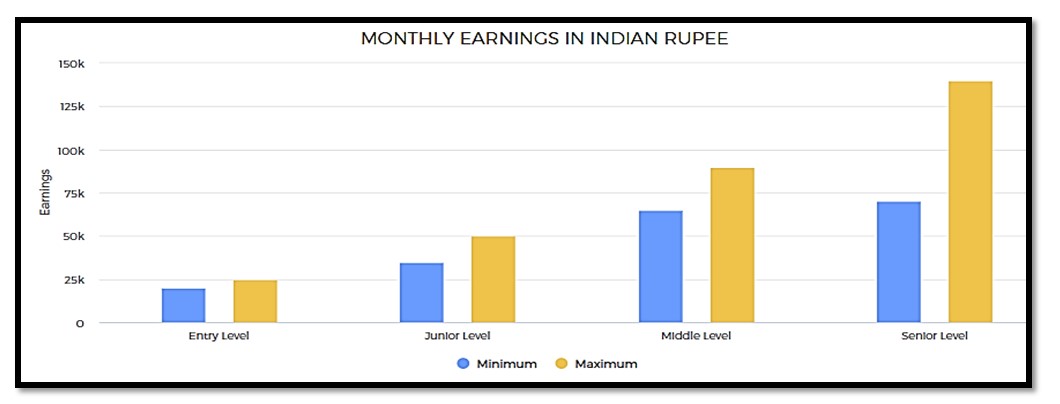
Monthly Earnings In Indian Rupee
Entry Level | Junior Level | Mid Level | Senior Level | ||||
Min Earning | Max Earning | Min Earning | Max Earning | Min Earning | Max Earning | Min Earning | Max Earning |
20000 | 25000 | 35000 | 50000 | 65000 | 90000 | 70000 | 140000 |
1. Entry level: 0 - 2 years of work experience
2. Junior Level: From 1 to 12 years of work experience
3. Mid Level: From 5 to 20+ years of work experience
4. Senior Level: From 10 to 25+ years of work experience (there could be exceptions in some high-end technical, financial, engineering, creative, management, sports, and other careers; also shortly, people will reach these levels much faster in many careers and some careers, these levels will have no meaning as those careers will be completely tech skill driven such as even now, there is almost no level in a Cyber Security Expert’s job)
Work Activities
1. Analysing and interpreting data and information: Analysis of data and information to find facts, trends, reasons behind situations, etc.; interpretation of data to aid in decision-making.
2. Assisting and caring for people: Assisting people in availing of services; taking care of people in different situations; offering help and services to others.
3. Communicating with co-workers and others: Communicating with people in writing, verbally or otherwise inside your workplace and various other people who have professional relationships with your place of work including vendors, government officials, etc., or with people at large.
4. Decision-making and problem-solving: Analysis of data and information; evaluation of alternative decisions and results of decisions; taking the right decisions and solving problems.
5. Getting Information and learning: Observing, hearing, reading, using computers, or otherwise obtaining information and learning from it.
6. Identifying objects, actions, and events: Identifying various characteristics of objects; observing and understanding actions and events; understanding changes in actions and events.
7. Inspecting situations, events, and people: Inspecting situations, events, and people to understand the reasons and causes for the situation or events to happen; inspecting people to understand reasons behind their behavior and actions.
8. Organising, planning, and prioritizing tasks: Planning and organizing tasks to achieve work goals; prioritizing tasks to achieve goals and making the best use of the time available.
9. Providing advice and consultation to others: Giving advice or consultation to others about various issues, conceptual matters, know-how, scientific matters, products, or services.
10. Updating and using relevant knowledge: Keeping updated with the latest knowledge relevant to your fields of work and using the relevant knowledge in getting things done.
11. Using computers for work: Using computers for day-to-day office work; using computer software for various applications in day-to-day professional work; entering data and processing information; for writing.
12. Working directly with people: Working directly with people to offer them products and services, providing assistance, etc.
13. Working in a team: Working in a team of people; developing a team; and maintaining professional relationships among team members.
Future Prospects
According to FICCI reports, the Indian Health industry is witnessing an influx of new cardiovascular technologies in diagnostics and monitoring which will enhance the treatment and management of cardiac surgery, arrhythmia management (arrhythmia is a condition or a problem related to the rate or rhythm of the heartbeat), interventional cardiology, ablation procedures, and blood pump technology. Many private and government hospitals have adopted high-end technological services catering to the rising demands. Therefore a career in this allied healthcare sector would witness immense demand in the upcoming years.
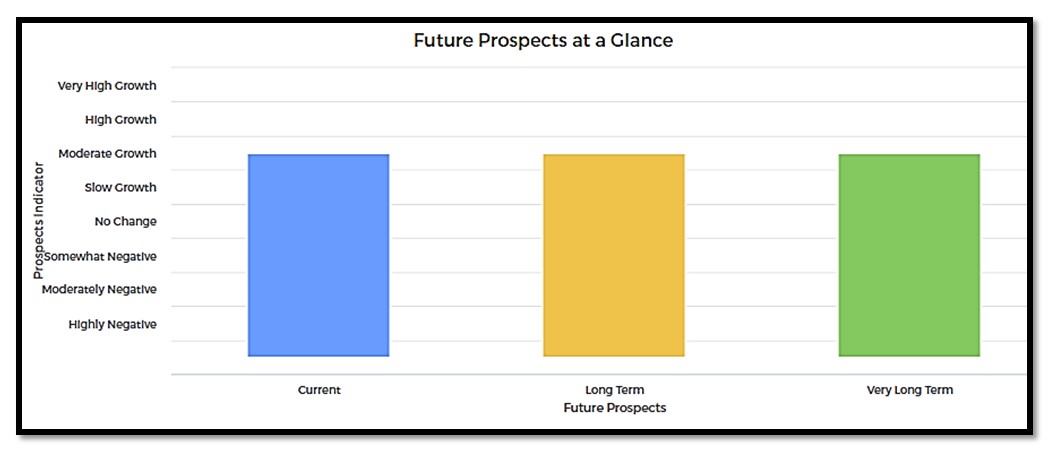
Future Prospects At A Glance
Current (0-1 year) | Long Term (2-5 years) | Very Long Term (6-10 years) |
Moderate Growth | Moderate Growth | Moderate Growth |


